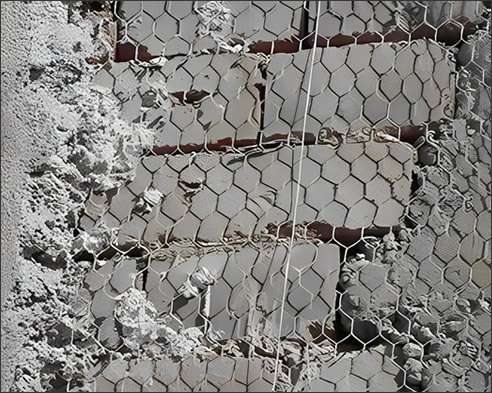Self-furring Stucco Netting is a specialized construction material designed for use in plastering and stucco applications. Hexagonal stucco netting is made from high-quality galvanized steel wire, featuring a flexible hexagonal mesh pattern, ensuring a durable and reliable base for stucco coatings. Hexagonal Stucco Netting is applied over the plaster base coat, this wire mesh layer adds flexibility and crack resistance, ensuring a smooth and durable finish for wall and ceilings.
Common Specification
- Material: Galvanized steel wire
- Mesh Pattern: Hexagon pattern
- Wire Gauge: 17, 20 to 22 gauge
- Mesh Size: 1 inch to 2 inch openings
- Width: Available in standard widths, such as 36 inches and 48 inches
- Length: Supplied in rolls, typically 150 feet long
Features:
- Corrosion Resistance: Galvanized coating provides protection against rust and corrosion
- Flexibility: The hexagonal pattern netting allows for easy bending and shaping to fit various surfaces
Applications:
- Exterior stucco and plastering
- Interior plaster reinforcement
- Masonry wall reinforcement
Export Types
Stucco Netting Hexagonal Opening 1" x 20 Gauge

Mesh: 1” hexagonal opening
Wire Diameter: 20-gauge
Finish:
Hot Dipped Galvanized
Roll size:
36” x 150’
Design: Self furring stucco netting
Stucco Netting is supplied with accessories:
Stucco Corner, 10-foot
Stucco Corner, 8-foot
Stucco Corner, 10-foot, 1-Coat
1-1/2” Stucco Netting 17-Gauge Galvanized
Mesh: 1-1/2” hexagonal opening
Wire diameter:
17 gauge
Finish:
Hot Dipped Galvanized
Roll size:
37-1/2” x 150’
Design: 37-1/2” x 150’ self furring stucco netting
1-1/2” Hexagonal Hole Stucco Netting with Paper Backing
Mesh: 1-1/2” hexagonal opening
Wire diameter: 17-gauge
Finish:
Galvanized
Design: Stucco netting galv.
with UU-B-790a Building Paper, Type 1, Grade "D", Style 2.Paper Backing
We also supply roll of stucco netting 455’ x 48”.
Using stucco netting with expanded diamond mesh lath provides a balanced approach to reinforcement:
Stucco Netting can be cut to size and shaped to fit around corners and irregular surfaces. Self-furring stucco netting simplifies installation by ensuring proper plaster embedment.
Expanded Mesh Lathing must be fastened securely to the substrate to provide a stable base for plaster. Its rigidity can make it more challenging to install around curves and corners.
Steps of Using Stucco Netting and Metal Lath:
- Install Expanded Diamond Mesh Lath: Securely attach expanded diamond mesh lath to the substrate using appropriate fasteners. Ensure the lath is properly positioned and overlaps at joints.
- Apply Base Coat: Apply the initial layer of plaster or stucco over the expanded diamond mesh lath.
- Embed Hexagonal Stucco Netting: While the base coat is still wet, embed the hexagonal stucco netting into the surface. Smooth out any wrinkles or air bubbles to ensure full coverage.
- Apply Final Coats: Apply subsequent layers of plaster or stucco, ensuring the hexagonal stucco netting is completely embedded and bonded to the surface.
Benefits of Using Stucco Netting and Metal Lath in Construction:
- Superior Strength: The rigid support from expanded diamond mesh lath combined with the flexibility of stucco netting creates a highly resilient reinforcement system.
- Enhanced Durability: Dual-layer reinforcement significantly reduces the risk of cracking and other damage, ensuring the longevity of the plaster or stucco finish.
- Adaptability: This combination allows for tailored reinforcement suitable for walls, ceilings, and exterior finishes.


